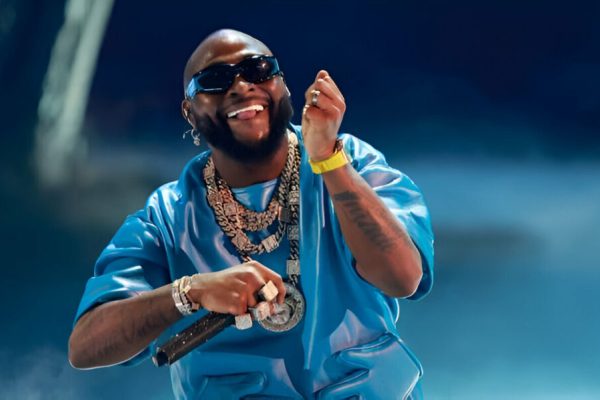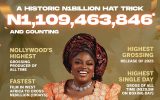by Wilfred Okiche
At 73 years of age, Taiwo Ajai-Lycett (OON) is as feisty as ever. A quintessential artiste, a former journalist, educator and advertiser. She has led a rich and rewarding life. At this stage of her life, while her peers are mostly slowing it down, having earned the right to a peaceful retirement, Ms Ajai-Lycett still possesses the work ethic of a starlet in her prime, moving delicately from one production to the other. As comfortable on stage as she is on screen, this veteran performer sat down with us for a chat, after a long day at the Tinsel studios and it was a most rewarding experience.
Enjoy excerpts.
You have one of the most unique voices in all of entertainment. How much of it is as a result of training or does it come naturally to you?
I have had trainings extensively for my voice when I was coming up. I had teachers who taught me classical opera music. I had an Australian who taught me to sing for musicals, that is contemporary modern music. I had another professor who taught me speech and Mrs King who taught me speech and acting and at the Guildhall school of music and drama in London, I worked on the musicality of my voice so it has been almost 50 years investment in teaching my voice how to teach, how to talk, how to deliver speeches and how to enjoy it. One of my teachers taught me to read a lot of poetry because poetry does have a lyrical feel to it and helps with pronunciation. People always think it’s the looks that are important in our work but I beg to differ, I think it’s the voice that is infinitely more magical because if you then marry looks with a good voice and perfect delivery, then you are a winner.
For the screen, some would say looks tend to play the upper hand as people want to see images that are easy on the eye.
When Hollywood was coming up, there used to be silent cinema so it was all about looks then. When sound came, it was the actors who could speak well that commanded the new media, those who relied on their looks alone were swept out of circulation. So even though the medium of television is visual and people want to see pretty, they also want to be engaged with other senses and the actor who knows how to deliver their lines splendidly is ultimately the better one.
When you are on stage or screen performing, how do you know that you have nailed that particular scene? Do you feel it right there when the audience is giving you an ovation or do you look back after the scene is done and say, yes I think I got that?
Never when I am performing. You see when I am performing, I am a character and I am in character, I am not even aware of the audience. You don’t ever let yourself get conscious of the fact that people are watching you because then you are playing to the gallery. When am I ever aware that I nailed it? I never am. Only after the show when they come to me and say “mama that was great, that was awesome” but you cannot let yourself get carried away by that. There are many ways in which people receive what you are doing. I cannot afford to be watching for reactions because I am living another life up on stage. And even when I am done, I am tired because I give my work my all and I want to slowly divest myself of that character. So when people are coming to me to compliment me after the show, sometimes I just want to go to my room and lie down.
Do you ever feel typecast of late, like all the roles available to you are only the grandmotherly ones?
And what is wrong with playing mothers and grandmothers? I am 73 years old. Do you want to see me play a 15 year old girl?
I ask because actors complain that once they cross a certain age, the interesting roles tend to dry up for them, leaving only the character parts.
To tell you the truth, that is rubbish. You saw the V-monologues and you saw me in Hear word, wasn’t my monologue one of the most exciting? The one about the old lady who learnt to harness the power of the vagina? I think it was one of the most interesting, for all sorts of reasons; the colouration, the age of the woman. It all depends on perception. If people want to be young forever and assume that anything beyond the age of 40 is ancient and everything has dried up, then that is their problem, nothing has dried up for me. And why would I want to play a 40 or 50 year old? I play a mother here on Tinsel and my God, I give them a run for their money. Mothers and grandmothers will always be amongst us and why should I not play them? I think it’s the writers who have to bring their A-game in writing these characters better. What makes them think? What experiences have brought them to that age. This will help the young ones to see what their future is. The bitterness, the success, the pains of old age. I have always been typecast as strong, formidable women but what is wrong with that? We don’t have enough of them. We need to have women believe that they are formidable because we are formidable.
Is it that you have no interest in playing the weak women roles or you just do not know how to play them?
There is nothing wrong with playing the weak woman, there are a lot of weak women in society and our job is to tell their stories. I once played the grieving wife of the former prime minister of Congo, Patrice Lumumba who just receives news of her husband’s death on stage at the Dublin international festival and this woman was illiterate, meek while her husband was operating on the international level. It wasn’t a speaking role but I asked the director if I could sing a dirge and he agreed. That night, after my performance, I became a star in Dublin. The following day reporters were chasing me all around town, I was invited to various events. So what is weakness? It is like they say, there are no small roles, only small actors.
You have spoken extensively about working odd jobs while studying in London and you speak of those moments proudly. You think young people should learn to embrace the fact that that there is dignity in labour?
Indeed. The problem is materialism has eaten so deep into the fabric of today’s society, it is unfortunate. Young people of today want all the good things now and they are looking for someone to give it to them and when they do not find such a person, they are completely lost. I was encouraging an artist yesterday to organise something to exhibit his works and he says to me “where is the money?” And I tell him, it is ideas that create capital. When I got to London, first thing I did was look for the jobs that I wanted, and when I saw that I was not qualified for them, I did the ones I could get. From there I saved money, bought a typewriter, taught myself to type and built up from there. Till today, I work for my money, nobody gives me anything. This feeling of entitlement that I see young people carrying, that the country owes them something is false. It is bollocks to say that you did not go to school because your father died young, that is not the reason. You did not go to school because you think that your father dying young is the end of the road. In Europe and America, people do 2-3 jobs to send themselves to school. If you have ideas, go and pursue them. Ideas are more valuable than goods and services, God expresses himself through ideas.
You have at different points in your life been an educator, journalist, actor, advertiser, which of these career paths have you found the most rewarding for you
All of them. I am a weekly columnist for Daily Independent newspapers and all of these things are a part of my life, each one a separate part of the tapestry of my life. Very difficult for me to pick one out. Acting obviously has had a lot of impact but it is merely a fraction of my life. I teach people how to reinvent themselves at workshops and I love every one of them. The writing helps me think, teaching helps me learn more and more, acting helps to express my creativity. All of this is me.
You would seem the perfect candidate to teach about reinvention considering you have done that personally and professionally so many times
Yes I have and I love to impart my knowledge to the young ones every chance I get. I am working on making the sessions a bit more regular and formal
Would you consider marrying again?
At my age? You are joking. What do I want to do with marriage?
I ask because there was an interview where you said a younger man was courting you…
No. What I said was that he wanted to marry me. Courting is a different thing entirely, meaning you and I are an item and you are preparing me for marriage and it wasn’t like that at all but people read what they want into that. And if someone says they want to marry me does it mean I want to marry them? Can I control who falls in love with me? I am a journalist myself so I assumed the journalist I spoke to would be intelligent enough to work that out but they chose to run with a salacious headline. Why can’t we discuss that as adults without making me look like I am a dirty old woman or a cougar, that’s what you call it these days isn’t it?
– Note: This interview has been condensed
















